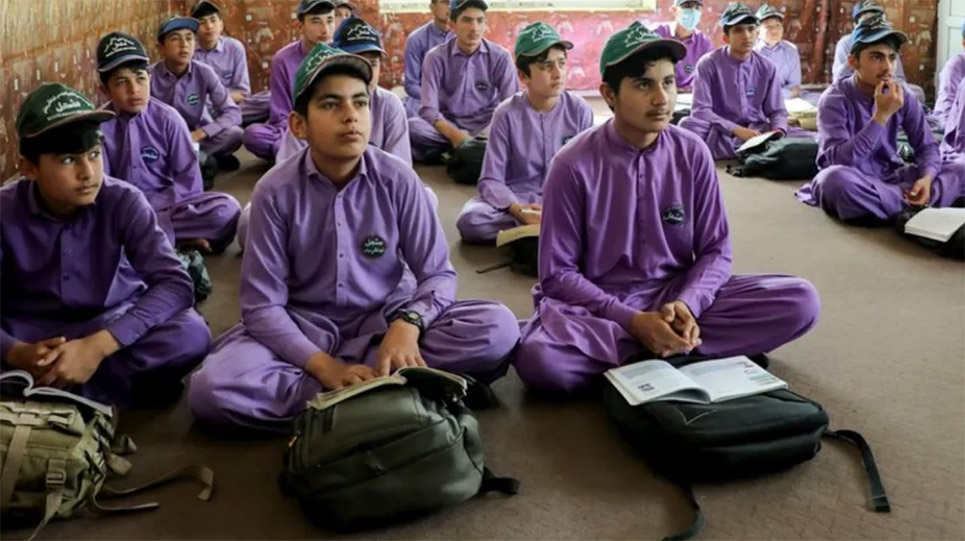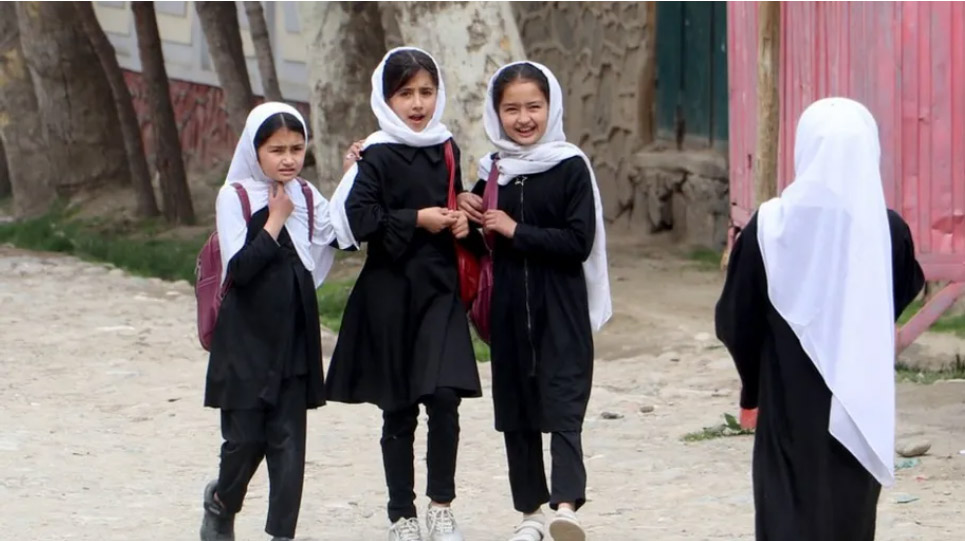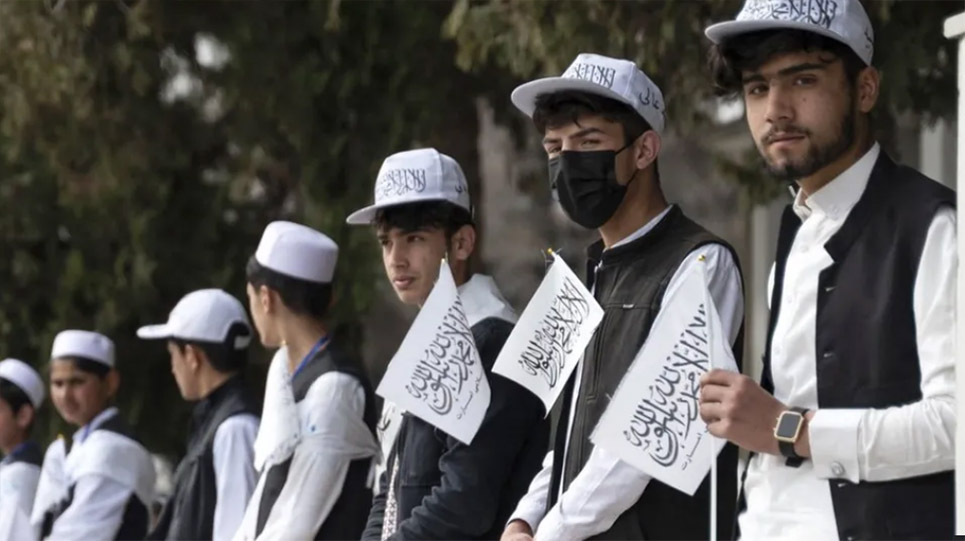
Boys - like these ones in Khost - returned to school this week, but teenage girls were kept at home
Aalia Farzan & Flora Drury
Teenage Afghan girls have told the BBC they feel "mentally dead" as the Taliban's ban on their education prevents them from returning to school once again.
More than 900 days have now passed since girls over 12 were first banned.
The Taliban have repeatedly promised they would be readmitted once a number of issues were resolved - including ensuring the curriculum was "Islamic".
But they have made little comment as a third new school year started without teenage girls in class this week.
The BBC has asked the Taliban's education minister for an explanation, but he has so far not responded. The Taliban's chief spokesman told local TV there had been "some problems and shortcomings for different reasons" in getting the ban lifted.
According to Unicef, the ban has now impacted some 1.4m Afghan girls - among them, former classmates Habiba, Mahtab and Tamana, who spoke to the BBC last year.
The hope they described 12 months ago is still there, but seems to have dwindled.
"In reality, when we think, we don't live, we are just alive," Mahtab, 16, says. "Think of us like a moving dead body in Afghanistan."
Tamana - who dreams of a PhD - agrees. "I mean, we are physically alive but mentally dead," she says.
Girls were first singled out and prevented from going to secondary school back in September 2021 - a month after the Taliban took control of the country.
Acting Deputy Education Minister Abdul Hakim Hemat later told the BBC that girls would not be allowed to attend secondary school until a new education policy in line with Islamic and Afghan traditions was approved, which would be in time for the start of school in March 2022.

Girls are allowed to attend school up until secondary under the Taliban
Two years later, Zainab - not her real name - is among the 330,000 girls Unicef estimates should have started secondary school this March. She had held onto hope that she and fellow girls in Grade Six would be able to continue, up to the point her headmaster entered the exam hall to explain they would not be able to return for the new term.
Zainab had been top of her class. Now, she tells the BBC: "I feel like I have buried my dreams in a dark hole."
Zainab's father has attempted to leave Afghanistan, but so far without success. Officially, Zainab's only option is classes at government-controlled religious schools, or madrassas - something the family do not want.
"It is not an alternative to school," her father says. "They will only teach her religious subjects."
For now, she attends an English class being quietly run in her neighbourhood - one of many which have quietly emerged in defiance of the ban in the last few years. Girls have also been able to keep up their studies by following courses online, or watching programmes like BBC Dars - an education programme for Afghan children, including girls aged 11-16 barred from school, described as a "learning lifeline" by the United Nations last year.
But Zainab and girls like her are among the more fortunate ones. When families are struggling to get enough to eat - as many in Afghanistan are - accessing online education is simply not seen "as a priority for their daughters", notes Samira Hamidi, Amnesty International's regional campaigner.
The future for many of Afghanistan's girls is "bleak", she warns - pointing to the fact young girls are continuing to be married off when they reach puberty, and are further endangered by the Taliban's rollback of laws designed to protect women in abusive marriages.
And it is not just 13-year-olds being prevented from accessing an education. The BBC has found the ban even being extended to younger girls if they appear to have gone through puberty.
Naya, not her real name, is just 11 but is no longer attending school in her home province of Kandahar. Her father says the government has "abandoned" her because she looks older than she is.
"She is larger than average, and that was the reason the government told us she couldn't go to school. She must wear the veil (hijab) and stay at home."
He doesn't hold out much hope for the rules changing under the current regime, but was keen to stress one point: the idea the people of Afghanistan backed the Taliban's ban was an "absolute lie".
"It is absolutely an accusation on Afghans and Pashtuns that they don't want daughter's education, but the issue is vice-versa," he said. "Specially in Kandahar and other Pashtun provinces (where Pashtun people live), a lot people are ready to send their daughters to schools and universities to get education."

Afghan boys at a celebration to mark the opening of the school year this week
The ban on a secondary education is far from the only change these girls are facing, however. In December 2022, women were told they could no longer attend university. Then there were the rules restricting how far a woman could travel without a male relative, on how they dressed, what jobs they could do, and even a ban on visiting their local parks.
There are hopes, says Amnesty's Samira Hamidi, that the secret schools and online education "can be expanded". But, she added: "In a country with over one million girls facing a ban on their fundamental human rights to education, these efforts are not enough."
What it needs, she argues, is "for immediate and measurable actions by the international community to pressurise the Taliban", as well as wider international support for education across the country.
But until that happens, girls like Habiba, Mahtab and Tamana will remain at home.
"It's very difficult," says Habiba, 18. "We feel ourselves in a real dungeon."
But she says she still has hope. Her friend Tamana is not so sure.
"Honestly, I don't know whether the schools will reopen or not under this government which doesn't have a bit of thought or understanding for girls," the 16-year-old says.
"They count the girls as nothing."



